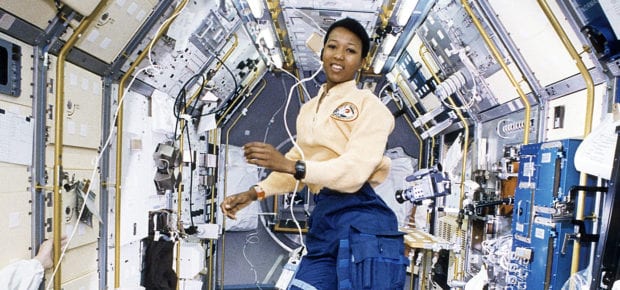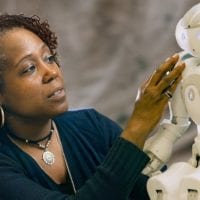February 10, 2020
These five engineers’ great strides in technological innovations and cultural breakthroughs impact our lives every day. This Black History Month, we honor the engineers who came before us to make our industry and world a better place, and celebrate today’s engineers who continue to make a difference.
1. Mae Jemison
Mae Jemison is the first African American woman to enter space on the Endeavour space shuttle in September 1992. Jemison attended Stanford University on a scholarship and earned her bachelor of science in chemical engineering and received a bachelor of arts in African and African-American studies. She then went on to attain her doctorate in medicine from Cornell University.
While orbiting the Earth on the Endeavour, Jemison co-investigated two bone cell research experiments. After Jemison left NASA, she taught at Dartmouth College and founded the Jemison Group, which encourages schools to foster student’s love of science and technology.
2. Otis Boykin
Mostly known for his wire precision resistor for televisions and radios and a control unit for the pacemaker, Otis Boykin developed a variety of technological devices and had 26 patents at the time of his death in 1982. Boykin graduated from Fisk college in Nashville, Tennessee, and later became a lab assistant with the Majestic Radio and TV Corporation in Chicago, Illinois.
Boykin also developed a device that has the ability to withstand extreme temperature changes and was used by the United State military for guided missiles and IBM computers. His passion for working with resistors made them more reliable, changed a variety of industries and paved the way for next innovations to come forward.
3. Hattie Scott Peterson
Hattie Scott Peterson paved the way for all future female engineers by being the first African American woman to hold an engineering degree. Peterson graduated from Howard University with a Bachelor of Science in Civil Engineering in 1946.
Peterson went on to work as a survey and cartographic engineer for the U.S. Geological Survey in California, and was passionate about encouraging women to pursue engineering as a profession.
See also Katherine Johnson, the Hidden Figures Mathematician Who Got Astronaut John Glenn Into Space
4. Mark Dean
Mark Dean is a computer scientist and engineer who helped develop many technologies used on a daily basis. Dean is known for developing the PC monitor, the Industry Standard Architecture system bus (ISA) and the first gigahertz chip. An ISA bus allows more than one expansion card to operate with a computer’s motherboard and a gigahertz is a clock frequency that helps speed up a computer’s processor.
Dean graduated from the University of Tennessee in 1979, before moving to IBM to develop industry-changing technologies. He served as the Interim Dean and John Fisher Distinguished Professor, University of Tennessee Tickle College of Engineering in 2013 and is now retired.
5. Ayanna Howard
Ayanna Howard has made great strides in developing robotics and artificial intelligence technologies with human-like cognitive abilities. Howard, an IEEE Senior member, received a bachelor of science in engineering from Brown University and then her master of science and PhD in electrical engineering form the University of Southern California in 1999.
Howard has worked on a variety of robotic projects such as with NASA, to study Arctic ice shelves and help children with special needs. She is currently a professor and chair for the school of interactive computing at Georgia Tech.
See also How Humanoid Therapy Robots Will Help Older Adults Become More Self-Sufficient





 Meaningful Momentum or Running in Place?
Meaningful Momentum or Running in Place? AI Through Our Ages
AI Through Our Ages Liquid Infrastructure: Our Planet's Most Precious Resource
Liquid Infrastructure: Our Planet's Most Precious Resource The Impact of Technology in 2025
The Impact of Technology in 2025 Quantum and AI: Safeguards or Threats to Cybersecurity?
Quantum and AI: Safeguards or Threats to Cybersecurity? Why AI Can't Live Without Us
Why AI Can't Live Without Us Bits, Bytes, Buildings and Bridges: Digital-Driven Infrastructure
Bits, Bytes, Buildings and Bridges: Digital-Driven Infrastructure Impact of Technology in 2024
Impact of Technology in 2024 Emerging AI Cybersecurity Challenges and Solutions
Emerging AI Cybersecurity Challenges and Solutions The Skies are Unlimited
The Skies are Unlimited Smart Cities 2030: How Tech is Reshaping Urbanscapes
Smart Cities 2030: How Tech is Reshaping Urbanscapes Impact of Technology 2023
Impact of Technology 2023 Cybersecurity for Life-Changing Innovations
Cybersecurity for Life-Changing Innovations Smarter Wearables Healthier Life
Smarter Wearables Healthier Life Infrastructure In Motion
Infrastructure In Motion The Impact of Tech in 2022 and Beyond
The Impact of Tech in 2022 and Beyond Cybersecurity, Technology and Protecting Our World
Cybersecurity, Technology and Protecting Our World How Technology Helps us Understand Our Health and Wellness
How Technology Helps us Understand Our Health and Wellness The Resilience of Humanity
The Resilience of Humanity Harnessing and Sustaining our Natural Resources
Harnessing and Sustaining our Natural Resources Creating Healthy Spaces Through Technology
Creating Healthy Spaces Through Technology Exceptional Infrastructure Challenges, Technology and Humanity
Exceptional Infrastructure Challenges, Technology and Humanity The Global Impact of IEEE's 802 Standards
The Global Impact of IEEE's 802 Standards Scenes of our Cyber Lives: The Security Threats and Technology Solutions Protecting Us
Scenes of our Cyber Lives: The Security Threats and Technology Solutions Protecting Us How Millennial Parents are Embracing Health and Wellness Technologies for Their Generation Alpha Kids
How Millennial Parents are Embracing Health and Wellness Technologies for Their Generation Alpha Kids Space Exploration, Technology and Our Lives
Space Exploration, Technology and Our Lives Global Innovation and the Environment
Global Innovation and the Environment How Technology, Privacy and Security are Changing Each Other (And Us)
How Technology, Privacy and Security are Changing Each Other (And Us) Find us in booth 31506, LVCC South Hall 3 and experience the Technology Moon Walk
Find us in booth 31506, LVCC South Hall 3 and experience the Technology Moon Walk Virtual and Mixed Reality
Virtual and Mixed Reality How Robots are Improving our Health
How Robots are Improving our Health IEEE Experts and the Robots They are Teaching
IEEE Experts and the Robots They are Teaching See how millennial parents around the world see AI impacting the lives of their tech-infused offspring
See how millennial parents around the world see AI impacting the lives of their tech-infused offspring Take the journey from farm to table and learn how IoT will help us reach the rising demand for food production
Take the journey from farm to table and learn how IoT will help us reach the rising demand for food production Watch technical experts discuss the latest cyber threats
Watch technical experts discuss the latest cyber threats Explore how researchers, teachers, explorers, healthcare and medical professionals use immersive technologies
Explore how researchers, teachers, explorers, healthcare and medical professionals use immersive technologies Follow the timeline to see how Generation AI will be impacted by technology
Follow the timeline to see how Generation AI will be impacted by technology Learn how your IoT data can be used by experiencing a day in a connected life
Learn how your IoT data can be used by experiencing a day in a connected life Listen to technical experts discuss the biggest security threats today
Listen to technical experts discuss the biggest security threats today See how tech has influenced and evolved with the Games
See how tech has influenced and evolved with the Games Enter our virtual home to explore the IoT (Internet of Things) technologies
Enter our virtual home to explore the IoT (Internet of Things) technologies Explore an interactive map showcasing exciting innovations in robotics
Explore an interactive map showcasing exciting innovations in robotics Interactively explore A.I. in recent Hollywood movies
Interactively explore A.I. in recent Hollywood movies Get immersed in technologies that will improve patients' lives
Get immersed in technologies that will improve patients' lives